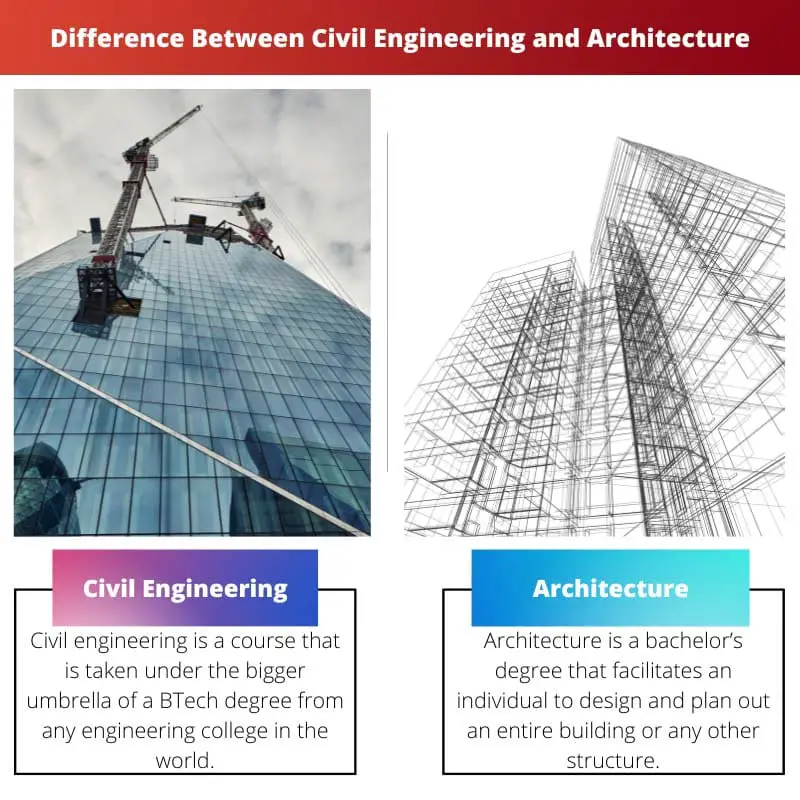Civil engineers and architects make the basis of any construction that is yet to start or has already been completed.
The courses taken by them are dubbed civil engineering and architecture respectively. Without them, the process of constricting anything might prove to be difficult as they make the foundation step to all construction.
Key Takeaways
- Civil engineering focuses on designing, constructing, and maintaining public works, such as roads, bridges, and dams. At the same time, architecture concentrates on designing and planning buildings and other structures.
- Architects prioritize aesthetics, functionality, and sustainability, whereas civil engineers emphasize structural integrity, safety, and cost-effectiveness.
- Civil engineers require a strong background in mathematics and physics, while architects need artistic skills, creativity, and a keen eye for detail.
Civil Engineering vs Architecture
Civil engineering is more concerned with the technical and structural aspects of construction, while architecture is more focused on design and aesthetics. Civil engineers work on large-scale infrastructure projects, while architects are more likely to work on smaller, individual buildings.

Civil engineering is a degree course that is taught to aspiring engineers who deal with the overall construction along with the safety of a building. It may not always be a building, it could be a factory or even a house or apartment.
Civil engineers make sure that the construction takes place without any discrepancies and that all precautionary measures are taken.
Architecture is a degree course taken by those who have a flair for designing and an idea about structure and construction.
Architects are most of the time responsible for the proper planning and designing of a building.
They have to make sure that every floor and every corridor are arranged in the right manner to avoid any tragedies from happening after construction.
Comparison Table
| Parameters of Comparison | Civil Engineering | Architecture |
|---|---|---|
| Advanced Degrees | Yes, for higher positions | Not many options |
| Activities to Oversee | Many | Not much |
| Phase of Construction | During the construction and after construction | Pre-construction |
| Number of Workers Under Them | Many | Barely any |
| Use of Complicated Software | Not necessarily | Yes |
What is Civil Engineering?
Civil engineering is a course that is taken under the bigger umbrella of a BTech degree from any engineering college in the world.
Civil engineering gives birth to civil engineers who are the major ones behind the construction.
Any construction site is invalid without the presence of a civil engineer as they form the entire support system of a construction site.
Civil engineers ensure that the entire process of a construction site is overseen properly throughout the entire time with no stones left unturned.
They have a strong base in mathematical formulations as well as in physics as they have to make sure the plan is foolproof.
They need to be apt in analytical skills as they must hold the responsibility for all the cost factors and the risks involved in any construction.
Civil engineers need to have a leadership quality as they are the ones leading the entire construction process.
Management skills are a necessary quality that is needed in any proficient civil engineer as they have many responsibilities that surround money.
Civil engineers not only deal with the construction, but they also make sure that the safety, electrical, water system, etc are all taken care of within a site.
They are seen analyzing sites or even conducting surveys regarding the cost factors and other risk units.
They need to have great communication skills so that they can converse properly with their clients and understand their client’s needs and their dream projects.
Civil engineers after their bachelor’s can go for further higher studies so that they are offered higher positions in companies.
The greater their experience out in the field, the more would their priority be among other civil engineers.

What is Architecture?
Architecture is a bachelor’s degree that facilitates an individual to design and plan out an entire building or any other structure that could be constructed.
Architects have their major share of work coming in before the actual construction process.
They are mainly involved in the designing and also the initial planning of the basic structure of a building.
This plan is then put to work at a construction site.
Architects need to be highly proficient in technical knowledge as well as in maths for their plans to be a success.
Every corner of a plan produced by an architect needs to be foolproof as it can’t fall into any tragedy.
They need to have good thinking skills and also a nice and creative mind so that they can come up with new designs at all times.
Architects work alone and not as a part of a team. This is to ensure that a single design is followed.
Later on, the designs are scrutinized by others to check for safety and correct it.
They use advanced software to help them with the designing of a plan and make the entire process easier to carry out.
Most of the working hours of an architect are spent on writing reports on a design that is on the way to its completion.
They look after the selection of a viable site and whether or not it is feasible and if it stays within the budget provided by the clients.
Meetings with clients are very common for architects as they might have to keep altering parts of the plan according to the needs of the respective client.
This increases the need for proper communication skills in an architect as they need to ensure that they understand what the client is requesting.
They can work under the government as a part of the public sector or even as a private firm architect.
It is common for architects to be working alone or as a freelancer. This ensures a much higher pay as they don’t have to pay other employees working under them or with them.

Main Differences Between Civil Engineering and Architecture
- Civil engineering candidates might have a whole set of people working below them as labor category workers while architecture students might not even have a single person working below them.
- Architecture course involves many design works and projects that need to be based on structures whereas civil engineering doesn’t have many design and creativity-related activities.
- Civil engineers take care of the construction and the work that follows whereas architects deal with the pre-construction part.
- While civil engineers have to conduct surveys and material counts regularly, architects need not do any such field works regularly.
- Architects have to use high-end designing software to ease the process of planning whereas it is not common for civil engineers to use any such programs.

- https://books.google.com/books?hl=en&lr=&id=moiSwq_w-YgC&oi=fnd&pg=PA10&dq=architecture&ots=uLpg60bS7D&sig=RFThlG_H2x8ddov8VQSuByANg_U
- https://books.google.com/books?hl=en&lr=&id=9Q3OBQAAQBAJ&oi=fnd&pg=PP1&dq=civil+engineering&ots=_2QGJWGbwK&sig=n3WDQzwEeGjvAiQyHfs3JlKraGw

I believe the information was very well explained and easy to understand.
This article is missing several key points and needs deeper research.
The references could be expanded.
I couldn’t agree more
The comparison table is very helpful and easy to follow.
It’s a matter of fact explanation.
Indeed!
I’m not entirely convinced of the credibility of this article.
I respectfully disagree
I understand your point, but it seems well supported by references.
What a beautiful and informative article! We need more of these!
I agree, this information is vital
I’m glad to see that the content met your expectations!
What an enriching content!